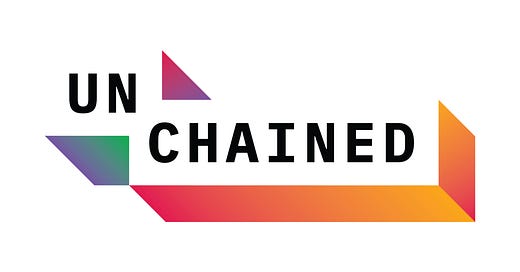SEC vs. Coinbase 💥 Who'll Win?
Weekly News Recap: 📱 Solana's smartphone sequel, 🔧 Ethereum's dencun dilemma, ⚖️ Do Kwon's trial delay, 💥 Socket's $3.3M hack, 😂 Franklin Templeton's social media, and more!
You are reading the Unchained Weekly newsletter, where we cover all the major news in the crypto space, providing insights into the market's latest trends, regulatory shifts, and technological advancements. Stay informed. Your no-hype resource.
After this week’s hearing, the SEC’s lawsuit against Coinbase is under the microscope, with significant repercussions for the industry’s future.
This case, centered around defining the regulatory scope and what constitutes a security in the realm of crypto, has stirred up crucial debates.
Attorney Sam Enzer dissects the nuances of this landmark case, highlighting the SEC's inconsistent definitions during the oral arguments. Enzer poignantly questions the clarity of regulations, asking, "How can you follow the law if the person enforcing the law gave you at least three different explanations of what the rule is within a mere oral argument?"
Don’t miss it!
Listen to the episode on Apple Podcasts, Spotify, Fountain, Overcast, Podcast Addict, Pocket Casts, Pandora, Castbox, Google Podcasts, Amazon Music, or on your favorite podcast platform. Or watch it on YouTube.
Weekly News Recap
Solana Mobile Advances With a Second Crypto Smartphone
Solana Mobile has announced the launch of its second crypto-integrated smartphone. This development comes shortly after the company revealed it couldn't fulfill all orders for its first model, the Saga, which experienced a complete sell-out in the United States and European Union.
Available for pre-order now at $450, the new device is more affordable than its predecessor and is set to ship in the first half of 2025. Solana Mobile spokesperson Megan Enright emphasized the company's commitment to making crypto products and services more accessible, stating, quote "This product will further what we set out to do with the Solana Mobile Saga … by putting Web3 securely in the palms of [the public’s] hands.”
The initial Solana phone saw a surge in popularity after traders discovered it contained millions of Solana memecoin BONK tokens worth more than the phone itself, contributing to its eventual sell-out. Anatoly Yakovenko, Solana's founder, highlighted on Unchained the importance of reaching a substantial user base for developers, aiming for 25,000 to 50,000 units.
In news related to the ecosystem, the community of major decentralized protocol Aave community is deliberating on a proposal to extend its services to the Neon EVM on the Solana network.
Ethereum's Goerli Testnet Experiences a Hitch with Dencun Upgrade
Ethereum's Dencun upgrade, a critical step in enhancing the blockchain's efficiency, was implemented on the Goerli testnet on Wednesday. This upgrade is part of Ethereum's ongoing evolution, following the Shapella upgrade of April 2023, which enabled the withdrawal of staked ether. The Dencun upgrade is aimed at reducing transaction costs on layer 2 networks by implementing proto-danksharding, a process that could slash these costs by a factor of 10 or more.
However, the rollout on the Goerli testnet encountered issues as the chain failed to finalize as expected. Developers believe the non-finality might be due either to low participation, estimated at around 80%, or validators being offline. Terence, a pseudonymous user, suggested the issue could stem from operators not upgrading necessary software, or else an unidentified bug. He wrote, "Personally, I will not base my assessment of Goerli Deneb’s readiness on the immediate finality results. It will take time to accurately evaluate the status."
The Dencun upgrade is slated for further testing on the Sepolia testnet on January 31 and the Holesky testnet on February 7, prior to its mainnet release.
SEC Postpones Decision on Fidelity's Ethereum ETF Proposal to March
In a Thursday filing, the U.S. Securities and Exchange Commission (SEC) has deferred its decision on Fidelity's proposed spot Ethereum exchange-traded fund (ETF) to March 5. According to the SEC, the extension is to allow adequate time to consider the proposed rule change and related issues. Fidelity's application for the Ethereum Fund, made in November, referenced a court ruling where judges questioned the SEC's consistent rejection of spot crypto ETFs, despite approving futures-based products.
Bloomberg Intelligence ETF analyst James Seyffart said the deferral was fully expected, and noted that the key dates to watch for will be in late May.
Trial of Former Terraform Labs CEO Postponed to March
The trial of Do Kwon, the former CEO of Terraform Labs, has been pushed back to late March. Originally scheduled for January 29, the delay is being attributed to complications in Kwon's extradition process from Montenegro, where he is currently detained. Kwon faces charges from the Securities and Exchange Commission (SEC) related to the collapse of the Terra USD algorithmic stablecoin. His legal representation has been trying to expedite his extradition, but faces challenges since Kwon is serving a sentence in Montenegro for a separate conviction.
U.S. District Court Judge Jed Rakoff, who is overseeing the case, has acknowledged the potential delay in Kwon's release from Montenegro but has said that the trial cannot be postponed further than the new date, which is set for March 25. The SEC had previously succeeded in their claim against Kwon and Terraform Labs for offering and selling unregistered securities.
Bankman-Fried's Parents Move to Dismiss FTX Lawsuit
Joseph Bankman and Barbara Fried, parents of FTX founder Sam Bankman-Fried, filed a motion to dismiss the lawsuit brought against them by debtors of FTX and Alameda Research. The lawsuit, filed in September 2023, accused them of fraudulent transfers and breaches of fiduciary duties. However, the couple’s attorneys argue that the familial relationship with their son does not automatically imply involvement in the alleged activities.
The plaintiffs in the case had claimed that Joseph and Barbara exploited their connections within FTX to enrich themselves, including purchasing a $16.4 million luxury property in the Bahamas with funds from the debtors. The lawsuit also alleged that the pair pushed for substantial political and charitable contributions, including to Stanford University, where they are professors, which supposedly boosted their professional and social status at the expense of FTX Group.

The defense attorneys stated that these allegations hold no legal significance, as there is no evidence suggesting that Bankman or Fried directly benefited from these transactions. They emphasized that the lawsuit does not prove that the parents used the Bahamas property as their primary residence, nor received any direct financial gain from the donations made to Stanford.
Socket Protocol Suffers $3.3 Million Hack in Cross-Chain Breach
The cross-chain protocol Socket faced a significant security breach this week, resulting in a loss of $3.3 million. This exploit affected wallets with infinite approvals to Socket contracts. The Socket team identified the issue and promptly paused the affected contracts to prevent further losses, assuring users that no immediate action was required on their end.
Blockchain analyst Spreekaway reported the exploit, which involved using a token approval from an Ethereum address to carry out the attack. The analyst advised users to revoke all approvals from this address, known as “Socket: Gateway” on Etherscan. Amid this incident, phishing scammers attempted to exploit the situation by creating a fake Socket account, urging users to revoke their approvals using a malicious app, but it was swiftly removed.
Bitcoin Mining Sector Faces Crucial Moment with Halving
Core Scientific, a major player in the Bitcoin mining sector, is set to relist its shares following its exit from bankruptcy. This move could mark a significant recovery step for the company, which faced challenges during the crypto market downturn.
Simultaneously, a report from CoinShares highlighted a looming challenge for Bitcoin miners. The upcoming Bitcoin halving, an event that halves the reward for mining new blocks, is expected to significantly impact profitability. The report suggests that only a few miners will remain profitable after the halving, underscoring the need for operational efficiency and technological advancements in the sector.
Furthermore, CoinDesk reported that Bitcoin miner outflows have reached a six-year high ahead of the halving. This activity indicates that miners are transferring their holdings to exchanges, possibly to build liquidity in anticipation of the halving's effects.
TrueUSD Depegging Triggers Market Speculation About Binance’s Activities
This week, the stablecoin TrueUSD depegged from its 1:1 parity with the U.S. dollar. The devaluation to $0.984 occurred following substantial sell orders on Binance, leading to a frenzy of speculation about the cause. The depegging coincided with a significant trade of TrueUSD for Tether's USDT stablecoin, followed by a large Bitcoin purchase for the same amount, suggesting the possible liquidation of Binance's TrueUSD holdings.
Concerns have been raised in the past about TrueUSD's ability to maintain its peg. The stablecoin had previously faced issues with real-time attestations of its reserves, leading to questions about its collateralization. Further complicating the situation, the lack of arbitrage opportunities on Poloniex, where TrueUSD has been trading at a discount, led some to be suspicious about withdrawal and deposit restrictions.
Genesis Global Trading Settles New York Lawsuit for $8 Million
Crypto lender Genesis Global Trading has agreed to pay $8 million to settle a lawsuit with the New York State Department of Financial Services (DFS). This settlement resolves allegations of anti-money laundering and fraud. Alongside the monetary settlement, Genesis will cease its business operations in New York and forfeit its BitLicense.
Adrienne A. Harris, Superintendent of DFS, said quote "Genesis Global Trading’s failure to maintain a functional compliance program demonstrated a disregard for the Department’s regulatory requirements and exposed the company and its customers to potential threats."
The settlement comes amid Genesis' ongoing legal challenges, including a lawsuit filed in October by the New York Attorney General's Office alleging that the company defrauded investors in conjunction with its parent company, Digital Currency Group, and Gemini Trust. Genesis, which declared bankruptcy earlier this year, remains involved in court proceedings to recover lost investor funds.
😁 Fun Bits: Franklin Templeton's Crypto Team Unleashes Meme Mayhem
Franklin Templeton, usually known for its staid financial expertise, caused a stir by handing its X, formerly Twitter, keys to its Digital Assets Research Team. This led to a flurry of tongue-in-cheek crypto tweets, transforming their typically composed feed into a treasure trove of crypto humor.
From declaring "speculation as a feature, not a bug" in crypto to expressing enthusiasm for Ethereum's “midlife crisis,” the team's posts were a far cry from the account’s usual corporate demeanor. This unexpected shift prompted a mix of hilarity and disbelief among followers, with some amused by the company's sudden “shitcoin shilling,” while others questioned the wisdom of its social media experiment.
Bitcoin enthusiasts found joy in the chaos, interpreting it as bullish for Bitcoin. Amid jokes about over-caffeinated interns and lawyer-imposed limitations on replies, Franklin Templeton's trial turned out to be a surprising and entertaining departure from the norm in the usually buttoned-down world of asset management.











